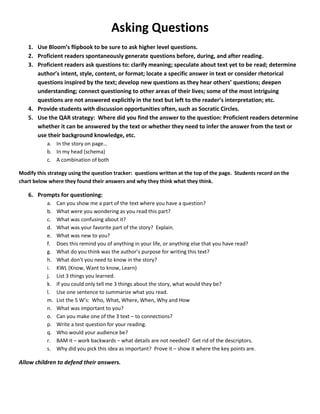
Asking questions
- 1. Asking Questions 1. Use Bloom’s flipbook to be sure to ask higher level questions. 2. Proficient readers spontaneously generate questions before, during, and after reading. 3. Proficient readers ask questions to: clarify meaning; speculate about text yet to be read; determine author’s intent, style, content, or format; locate a specific answer in text or consider rhetorical questions inspired by the text; develop new questions as they hear others’ questions; deepen understanding; connect questioning to other areas of their lives; some of the most intriguing questions are not answered explicitly in the text but left to the reader’s interpretation; etc. 4. Provide students with discussion opportunities often, such as Socratic Circles. 5. Use the QAR strategy: Where did you find the answer to the question: Proficient readers determine whether it can be answered by the text or whether they need to infer the answer from the text or use their background knowledge, etc. a. In the story on page… b. In my head (schema) c. A combination of both Modify this strategy using the question tracker: questions written at the top of the page. Students record on the chart below where they found their answers and why they think what they think. 6. Prompts for questioning: a. Can you show me a part of the text where you have a question? b. What were you wondering as you read this part? c. What was confusing about it? d. What was your favorite part of the story? Explain. e. What was new to you? f. Does this remind you of anything in your life, or anything else that you have read? g. What do you think was the author’s purpose for writing this text? h. What don’t you need to know in the story? i. KWL (Know, Want to know, Learn) j. List 3 things you learned. k. If you could only tell me 3 things about the story, what would they be? l. Use one sentence to summarize what you read. m. List the 5 W’s: Who, What, Where, When, Why and How n. What was important to you? o. Can you make one of the 3 text – to connections? p. Write a test question for your reading. q. Who would your audience be? r. BAM it – work backwards – what details are not needed? Get rid of the descriptors. s. Why did you pick this idea as important? Prove it – show it where the key points are. Allow children to defend their answers.
- 2. Sample Strategy Study: Model your questions with picture books or other short text over several days – record questions on chart paper that has categories for each of the purposes and times readers ask questions, e.g., questions before reading that relate to author’s intent. Make clear the distinction between reading aloud and thinking aloud as you model. Talk to the children about why readers pose questions, how questions help them to comprehend more deeply, and how they use questions in other academic areas and in their lives outside school. Gradually invite the students to share their questions, adding them to appropriate places on the chart in the children’s language – continue to model, gradually diversifying the genre of text you use. Invite children to meet in small groups or pairs to share and compare questions – encourage them to list new questions generated through these discussions. Continue modeling with invitational groups of children who might benefit from more explicit instruction. Remind book clubs to focus on questioning in their conversations throughout the strategy study. In reading conferences, focus on their questions before, during, and after reading; ask students to identify places in the text where they had questions and ask them to use the class chart to categorize their questions; invite them to pose types of questions they haven’t tried yet; use think-alouds to assess their use of questioning; ask the children to identify ways in which posing questions helps deepen your comprehension; model how posing questions helps deepen your comprehension. Focus sharing sessions on questions children discovered while reading and can add to the class chart – add new categories to the chart if necessary. Continue large and invitational group modeling in a variety of texts – modeling is most concentrated at the beginning of a strategy study, but continues throughout. Make frequent connections between questioning and other strategies on which the children have already focused. Use a variety of tools such as coding, highlighting markers on copied text, self-adhesive notes, question maps, story maps, and double entry diaries to help children become aware of and record their questions. Mosaic of Thought p. 120-121